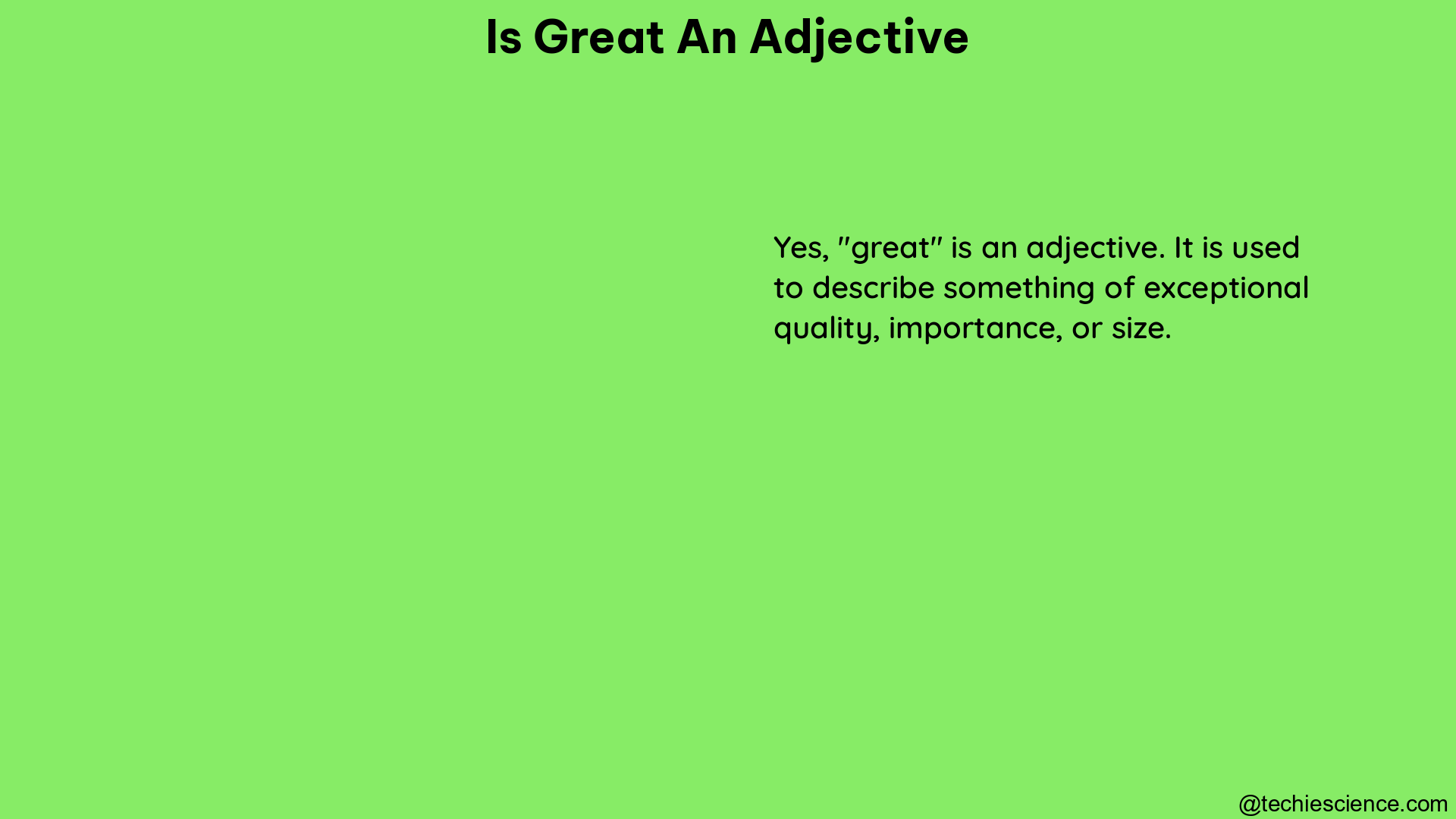Yes, “great” is an adjective with multiple meanings and uses that can be categorized into several main areas. Understanding the nuances of this versatile word is essential for effective communication in English.
Size and Quantity
Large in Size
- “The house has a great room.” (informal)
- The term “great” can be used to describe something that is large in size, such as a room or a physical space.
Large in Number
- “A great crowd had gathered.” (formal)
- “Great” can also be used to describe a large number or quantity of something, such as a crowd or a group.
Used in Names of Animals
- “The Great Dane is a large breed of dog.” (formal)
- “Great” is often used in the names of certain animal species, particularly those that are known for their large size, such as the Great Dane.
Quality and Degree

Very Good or Excellent
- “That’s a great idea.” (informal)
- When used to describe something’s quality, “great” can mean that it is very good or excellent, such as an idea or a performance.
Highly Skilled or Talented
- “She’s a great singer.” (formal)
- “Great” can also be used to describe someone who is highly skilled or talented in a particular area, such as a singer or an artist.
Important or Significant
- “This is a great opportunity.” (formal)
- In some contexts, “great” can be used to indicate that something is important or significant, such as an opportunity or a milestone.
Family Relationships
More Distant in a Family Relationship by One Generation
- “My great-aunt is my father’s aunt.” (formal)
- When used in the context of family relationships, “great” is used to indicate a more distant relationship by one generation, such as a great-aunt or a great-grandparent.
Emphasis and Irony
Used for Emphasis
- “I’m feeling great today.” (informal)
- “Great” can be used for emphasis, to express that something is particularly good or positive, such as one’s mood or feelings.
Used Ironically
- “That’s just great. Now I’ve lost the tickets.” (informal)
- In some cases, “great” can be used ironically, to express frustration or disappointment about a situation that is not actually great.
Examples
- “The party was a great success.” (formal)
- “He’s a great comfort to his mother.” (formal)
- “I had a great time at the movies.” (informal)
- “She’s a great judge of character.” (formal)
Synonyms
- Large: “They live in a big house in the country.” (formal)
- Famous: “Rembrandt was a great painter.” (formal)
- Excellent: “This is an excellent restaurant.” (formal)
Grammatical Specification
- Pronunciation: /ɡreɪt/ (UK) or /ɡreɪt/ (US)
- Part of Speech: Adjective
- Comparative and Superlative Forms: Greater, Greatest
Theoretical Explanation
The adjective “great” is a versatile word that can be used in a variety of contexts to convey different meanings. It can be used to describe the size or quantity of something, as well as its quality or degree of importance. Additionally, “great” can be used to express emphasis or irony, and it can also be used in the context of family relationships.
Understanding the nuances of the word “great” is crucial for effective communication in English. By being aware of its various uses and meanings, language learners and users can better express themselves and understand the intended meaning in different situations.
Reference Links
- https://dictionary.cambridge.org/us/dictionary/english/great
- https://www.merriam-webster.com/dictionary/great
- https://www.oxfordlearnersdictionaries.com/us/definition/american_english/great_1

Hi…. I am Goutam Datta. I have completed a double M. A. in English and B. Ed. I am a creative writer. Currently, I am a part of the LambdaGeeks.